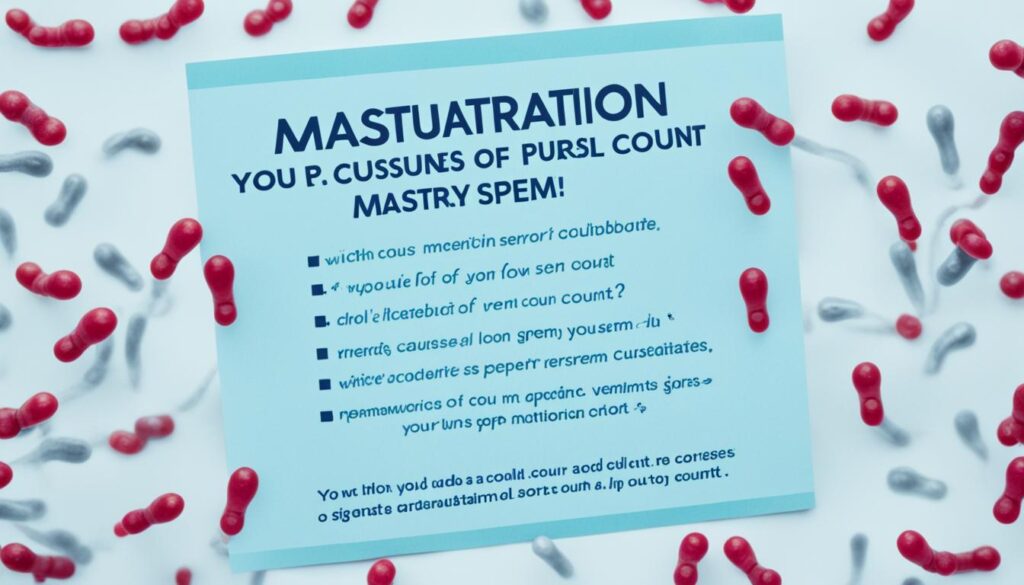Did you know that approximately 70-80% of men masturbate at some point in their lives? It’s a common sexual activity that many individuals engage in for various reasons – pleasure, stress relief, or simply out of curiosity. However, there is a question that often comes up: Does masturbation cause low sperm count?
In this article, we will explore the latest scientific research to determine if there is a link between masturbation and sperm count. We will delve into the effects of masturbation on male fertility and debunk any myths surrounding this topic. So, if you’ve ever wondered about the impact of masturbation on sperm count, keep reading to discover the truth.
The Science Behind Sperm Production and Sperm Count
Understanding the intricacies of sperm production is key to exploring its relationship with sperm count and male fertility. Sperm production, scientifically known as spermatogenesis, is a highly complex and continuous process that takes place within the testicles.
During spermatogenesis, the testes produce millions of sperm cells every day. These cells undergo a series of developmental stages, from their initial formation to the maturation of fully functional spermatozoa. This intricate process takes approximately 64 to 72 days.
The ultimate goal of spermatogenesis is to generate mature sperm cells capable of fertilizing an egg and initiating pregnancy. Sperm count refers to the number of viable sperm cells present in a man’s semen. A healthy sperm count is vital for male fertility and the prospect of successfully conceiving a child.
Within the testicles, specialized cells called Sertoli cells nurture developing sperm cells and provide them with essential nutrients and support. This nurturing environment enables the spermatogenic cells to differentiate and mature, eventually becoming motile spermatozoa.
The Spermatogenesis Process
The process of spermatogenesis can be divided into three fundamental stages:
- Spermatocytogenesis: This stage involves the multiplication of the spermatogonia, which are the precursor cells of sperm. During this phase, the spermatogonia undergo several rounds of cell division, resulting in the formation of spermatocytes.
- Meiosis: Meiosis is a specialized form of cell division that occurs in the spermatocytes. It consists of two rounds of chromosome separation, reducing the number of chromosomes in each cell to half. This process results in haploid spermatids.
- Spermiogenesis: Spermiogenesis represents the final stage of spermatogenesis. During spermiogenesis, the haploid spermatids undergo a series of structural changes to develop into mature sperm cells, or spermatozoa.
The end result of spermiogenesis is the production of viable spermatozoa equipped with a head containing genetic material, a midsection filled with mitochondria for energy production, and a tail for motility.
The Role of Hormones in Sperm Production
Sperm production is regulated by a complex interplay of hormones. The hypothalamus, a region of the brain, releases gonadotropin-releasing hormone (GnRH), which stimulates the pituitary gland to produce follicle-stimulating hormone (FSH) and luteinizing hormone (LH).
FSH and LH act on the testes, exerting their effects on the Sertoli cells and Leydig cells, respectively. Sertoli cells promote the development and maturation of spermatozoa, while Leydig cells produce testosterone, a crucial hormone necessary for spermatogenesis.
It’s important to note that sperm production is an ongoing, dynamic process influenced by various factors, including hormone levels and overall health.
“The process of spermatogenesis is incredibly intricate, involving multiple stages of cell development and differentiation. Hormones play a significant role in regulating this process and ensuring the production of viable spermatozoa.”
The Importance of Sperm Count for Male Fertility
Sperm count serves as a crucial indicator of male fertility. While there is no standard “healthy” sperm count, a lower count can make it more challenging to conceive a child naturally.
According to the World Health Organization (WHO), a normal sperm count is typically defined as having at least 15 million sperm cells per milliliter of semen. However, individual circumstances may vary, and other factors, such as sperm motility and morphology, also contribute to fertility.
A healthy sperm count increases the chances of successful fertilization and conception. It’s worth noting that numerous factors, including lifestyle choices and health conditions, can influence sperm count and overall male fertility.
| Factors Affecting Sperm Count | Impact on Sperm Production |
|---|---|
| Age | Gradual decline in sperm production as men age |
| Diet and nutrition | Poor diet can negatively impact sperm quality and count |
| Smoking and alcohol consumption | Smoking and excessive alcohol intake can reduce sperm count |
| Stress and emotional well-being | High stress levels may affect hormonal balance and sperm production |
What is Masturbation and How Does it Affect the Body?
Masturbation is a natural and normal form of sexual expression. It involves self-stimulation to achieve sexual pleasure. Masturbation releases hormones that produce feelings of pleasure and relaxation. It can also promote healthy blood flow and improve sleep quality.
When you engage in masturbation, your body releases endorphins, the “feel-good” hormones that create a sense of pleasure and happiness. These hormones help reduce stress, elevate mood, and enhance overall well-being. Additionally, masturbation can promote healthy blood circulation, which is vital for maintaining sexual and reproductive health.
Furthermore, masturbation can have a positive impact on sleep quality. After achieving orgasm, the body releases a hormone called prolactin, which helps induce relaxation and sleepiness. This can result in better sleep and improved overall sleep quality.
The Psychological Benefits of Masturbation
Masturbation not only provides physical pleasure but also offers psychological benefits. It can help individuals explore their own bodies, understand their sexual preferences, and enhance self-confidence and body positivity.
Expert Quote:
“Masturbation is a healthy and natural sexual activity that can contribute to overall sexual well-being. It provides individuals with an opportunity to explore their own bodies, experience pleasure, and develop a positive relationship with their sexuality.” – Dr. Emily Smith, Sexologist
Despite these positive effects, there are concerns regarding the impact of masturbation on sperm count, which will be addressed in the following sections.
Does Masturbation Cause a Decrease in Sperm Count?
There are many myths surrounding masturbation and its effects on sperm count. One common belief is that frequent masturbation can lead to a decrease in sperm count, impacting male fertility. However, scientific evidence suggests otherwise. Research indicates that masturbation itself is unlikely to cause a decrease in sperm count.
In fact, some studies have found that men who engage in regular masturbation may actually have higher sperm counts. This is because frequent ejaculation through masturbation helps the body eliminate older sperm and replace them with newer, healthier sperm. Additionally, masturbation can stimulate testosterone production, which is essential for sperm production and overall reproductive health.
It’s important to note that excessive or compulsive masturbation can be a sign of underlying mental health issues. Stress, anxiety, and other psychological factors may affect overall well-being and, in turn, fertility. Seeking support from a healthcare professional can be helpful in addressing any concerns related to excessive masturbation and its potential effects on mental health and fertility.
While masturbation itself is unlikely to cause a decrease in sperm count, it’s essential to maintain a balanced approach. Excessive or compulsive sexual behavior can lead to fatigue, which may affect the body’s ability to produce and ejaculate sperm effectively.
In conclusion, the scientific evidence does not support the belief that masturbation causes a decrease in sperm count. Regular masturbation can actually have positive effects on sperm count and overall reproductive health. However, it’s important to maintain a healthy balance and seek professional help if you have concerns about your sexual habits or fertility.
| Myth | Fact |
|---|---|
| Masturbation causes low sperm count. | Scientific evidence does not support this claim. |
| Regular masturbation can lead to infertility. | Masturbation itself does not cause infertility. |
| Excessive masturbation is always harmful. | Moderate and balanced masturbation is considered normal and healthy. |
It is important to separate misconceptions from scientific evidence when discussing the relationship between masturbation and sperm count. By dispelling these myths, we can provide clearer information and promote a better understanding of sexual health and fertility.
The Frequency of Masturbation and its Effect on Sperm Count
The frequency of masturbation can play a role in sperm count, but it’s important to understand the relationship between masturbation and low sperm count. While excessive masturbation is often associated with concerns about a decrease in sperm count, the reality is more nuanced.
Research suggests that engaging in frequent masturbation, which includes ejaculating through masturbation, is unlikely to cause a significant decrease in sperm count. However, it’s essential to note that there is no one-size-fits-all answer to how much is too much.
Although masturbation is a natural sexual activity, it’s important to recognize that the body has its limits. Excessive or overly frequent masturbation can lead to fatigue and a potential decrease in sperm quality. Therefore, maintaining a balance is key.
Excessive masturbation can put stress on the reproductive system, potentially affecting sperm production and quality. It is recommended to moderate the frequency of masturbation to ensure optimum reproductive health.
It’s important to listen to your body and be mindful of any signs of fatigue or other adverse effects. Finding a healthy middle ground that satisfies your sexual needs while maintaining optimal sperm count and quality is crucial.
Effects of Frequency on Sperm Count
While there is no definitive consensus on the ideal frequency of masturbation, studies have shown that moderate levels of ejaculation can have a positive impact on sperm count and overall reproductive health. Regular ejaculation helps to clear out older, less motile sperm and replenish the semen with fresh, vibrant sperm cells.
However, it’s worth noting that excessively frequent ejaculation through masturbation may not provide the necessary time for the body to produce and replenish sperm cells adequately. This can potentially lead to a decrease in sperm quality and quantity over time.
Tips to Maintain a Balance
To maintain a healthy balance between masturbation and sperm count, consider the following tips:
- Keep track of your ejaculation frequency and pay attention to any physical or mental signs of fatigue.
- Consider taking breaks and allowing your body time to replenish sperm cells.
- Practice other forms of sexual activity or intimate connection with a partner to vary your sexual experiences.
- Focus on overall lifestyle factors that contribute to reproductive health, such as regular exercise, a nutritious diet, and adequate sleep.
- Consider seeking advice from a healthcare professional if you have concerns about your sperm count or general sexual health.
| Frequency of Masturbation | Potential Effects on Sperm Count |
|---|---|
| Infrequent/Moderate | May have a positive impact on sperm count and overall reproductive health by allowing for proper replenishment of sperm cells. |
| Excessively Frequent | May lead to fatigue, decreased sperm quality, and potentially lower sperm count due to insufficient time for the body to produce and replenish sperm cells. |
How Other Lifestyle Factors Can Impact Sperm Count
While masturbation itself is unlikely to cause a significant decrease in sperm count, there are other lifestyle factors that can have an impact on male fertility. Poor diet, lack of exercise, smoking, and excessive alcohol consumption are all examples of lifestyle choices that can negatively affect sperm count and overall reproductive health.
When it comes to diet, a poor nutritional intake can result in deficiencies in key vitamins and minerals that are essential for sperm production and function. Similarly, lack of exercise can lead to weight gain, which has been linked to decreased sperm quality and count. Obesity, caused by a sedentary lifestyle and unhealthy eating habits, can also negatively impact fertility.
“Your diet and exercise habits play a significant role in your overall reproductive health and sperm count.”
Smoking cigarettes exposes the body to harmful chemicals that can damage sperm DNA and reduce sperm motility. Additionally, excessive alcohol consumption has been shown to decrease testosterone levels and impair sperm production.
It is important to recognize the impact of these lifestyle factors on sperm count and take steps to adopt healthier habits. A balanced diet rich in fruits, vegetables, whole grains, and lean protein sources can provide the necessary nutrients for optimal sperm production. Regular exercise, such as brisk walking or moderate-intensity workouts, can help maintain a healthy weight and improve overall reproductive health.
To further illustrate the impact of lifestyle factors, here is a table highlighting the effects of diet and exercise on sperm count:
| Lifestyle Factors | Effects on Sperm Count |
|---|---|
| Poor Diet | Deficiencies in key nutrients may affect sperm production |
| Lack of Exercise | Weight gain and reduced sperm quality |
| Smoking | Damage to sperm DNA and decreased motility |
| Excessive Alcohol Consumption | Lowered testosterone levels and impaired sperm production |
By making positive lifestyle changes, such as adopting a nutritious diet and incorporating regular exercise, you can improve your overall reproductive health and positively impact sperm count.
Masturbation and Infertility: Is There a Link?
Contrary to popular belief, there is no direct link between masturbation and infertility. Masturbation is a natural and healthy sexual activity that does not cause damage to the reproductive system or lead to infertility. It is essential to debunk the myth that masturbation can result in low sperm count and infertility.
Infertility can be caused by various factors unrelated to masturbation. Hormonal imbalances, genetic issues, physical abnormalities, and other medical conditions can contribute to difficulties in conceiving. It is important to understand that infertility is a complex issue with multiple potential causes.
When it comes to fertility, it is crucial to address the overall health of the individual and consider various factors that can affect reproductive capabilities. Both men and women can face challenges when trying to conceive, and it’s important to consult with a healthcare professional if there are concerns about fertility.
Debunking the myth of masturbation causing infertility allows individuals to enjoy a healthy and fulfilling sexual life without unnecessary worries. It is essential to prioritize open and honest conversations about sexual health, seek accurate information, and focus on overall well-being when considering the impact of masturbation on fertility.
The Role of Testosterone in Masturbation and Sperm Count
In the realm of male sexual function and sperm production, testosterone takes center stage. This essential hormone plays a critical role in regulating various aspects of reproductive health. When it comes to masturbation and sperm count, testosterone comes into play in fascinating ways.
When you engage in masturbation, your body responds by stimulating testosterone production. As a result, testosterone levels increase, which can have a positive impact on sperm count and quality.
However, it’s crucial to strike a balance. Excessive masturbation or compulsive sexual behavior can lead to a decrease in testosterone levels, which, in turn, can affect sperm count and overall reproductive health.
It’s important to understand that maintaining optimal testosterone levels is key to supporting healthy sperm production and promoting male fertility. Striking a balance in your sexual habits and overall lifestyle is key to maximizing the potential benefits of testosterone in relation to sperm count.
Now, let’s delve deeper into the role of testosterone in relation to masturbation and sperm count.
How Testosterone Impacts Sperm Production and Sperm Count
Testosterone, the primary male sex hormone, is responsible for regulating various aspects of reproductive function in men. It plays a crucial role in initiating and maintaining spermatogenesis, the process by which sperm cells are produced in the testicles.
During spermatogenesis, testosterone stimulates the Leydig cells in the testicles to produce and release a hormone called luteinizing hormone (LH). LH, in turn, acts on the testicular cells responsible for producing testosterone, promoting the production of this vital hormone.
Increased testosterone levels support healthy sperm production, ensuring an optimal sperm count and promoting sperm quality.
However, it’s important to note that testosterone alone does not determine sperm count. Other factors, such as genetic predisposition, overall health, lifestyle choices, and any underlying medical conditions, can all influence sperm count and quality.
The Impact of Excessive Masturbation on Testosterone Levels and Sperm Count
While masturbation can boost testosterone production, excessive or compulsive sexual behavior can have the opposite effect, leading to a decrease in testosterone levels.
The exact mechanisms underlying this phenomenon are still being studied, but it’s believed that chronic overstimulation of the sexual response system can desensitize the androgen receptors in the brain, potentially leading to lower testosterone production.
Lower testosterone levels can, in turn, affect sperm count and quality, potentially decreasing fertility. Therefore, maintaining a healthy balance in your sexual habits is essential to support optimal testosterone levels and promote reproductive health.
Remember, moderation is key. If you have concerns about your testosterone levels, sperm count, or overall reproductive health, it’s always a good idea to consult with a healthcare professional who can provide personalized advice and guidance.
In the next section, we will discuss the impact of frequency on sperm count and offer insights into maintaining a healthy balance in your sexual habits.
|
|
|
|
|
|
|
|
|
|
|
|
|
|
|
|
|
|
|
|
|
|
|
|
|
|
|
|
|
|
|
|
|
|
|
|
|
|
|
|
|
|
|
|
|
|
|
|
|
|
|
|
|
|
|
|
|
|
|
|
|
|
|
|
|
|
|
|
|
|
|
|
|
|
|
|
|
|
|
|
|
|
|
|
|
|
|
|
|
|
|
|
|
|
|
|
|
|
|
|
Tips for Maintaining Healthy Sperm Count Despite Masturbation

To maintain a healthy sperm count while enjoying masturbation, it’s crucial to adopt a lifestyle that supports optimal sperm production and fertility. By following these lifestyle tips, you can improve your chances of maintaining healthy sperm count and overall reproductive health.
Maintain a Healthy and Balanced Diet
A nutritious diet plays a significant role in supporting sperm production. Ensure that your diet includes a variety of fruits, vegetables, whole grains, lean proteins, and healthy fats. Incorporate foods rich in antioxidants, such as berries, spinach, and nuts, as they can help protect your sperm from oxidative damage. Avoid excessive consumption of processed foods, sugary drinks, and trans fats, as they may negatively affect sperm count and quality. Remember to stay hydrated by drinking plenty of water throughout the day.
Engage in Regular Physical Activity
Regular exercise not only keeps you physically fit but also promotes healthy sperm production. Aim for at least 150 minutes of moderate-intensity aerobic exercise, such as brisk walking, cycling, or swimming, each week. Additionally, include strength training exercises to improve your overall muscle strength and endurance. Prioritize a balanced exercise routine that suits your abilities and preferences, and consult with a healthcare professional if you have any underlying health conditions or concerns.
Limit Alcohol Consumption
Excessive alcohol consumption can have a detrimental effect on sperm count and quality. If you choose to drink alcohol, do so in moderation. The Centers for Disease Control and Prevention (CDC) defines moderate drinking as up to one drink per day for men. However, it’s advisable to consider abstaining from alcohol altogether when trying to conceive or if you have concerns about your sperm count.
Avoid Excessive Masturbation
While masturbation is a natural and healthy sexual activity, excessive masturbation may lead to fatigue and a decrease in sperm quality. It’s important to find a balance that works for you. Listen to your body and avoid excessive or compulsive behavior. If you have concerns about your masturbation habits or their impact on your sperm count, seek guidance from a healthcare professional.
Seek Help if Necessary
If you’ve been trying to conceive without success or have concerns about your fertility, it’s essential to seek help from a healthcare professional specializing in reproductive medicine. They can provide personalized advice and guidance based on your specific circumstances.
Remember, maintaining a healthy sperm count requires a holistic approach that includes healthy lifestyle choices, regular medical check-ups, and open communication with your partner. By taking care of your overall well-being, you can support healthy sperm production and improve your chances of achieving your reproductive goals.
How Masturbation and Sperm Count Affect Male Fertility
The topic of male fertility is closely intertwined with sperm count and quality. While masturbation itself is unlikely to have a significant impact on sperm count, it is important to note that a low sperm count or poor sperm quality can make achieving pregnancy more challenging for couples. Let’s take a deeper dive into how masturbation and sperm count can affect male fertility and explore the importance of maintaining a healthy balance between sexual activity and reproductive health.
The Role of Sperm Count in Male Fertility
Sperm count, which refers to the number of viable sperm cells in a man’s semen, is a crucial factor in male fertility. The quality and quantity of sperm directly influence the chances of successful fertilization and conception. A higher sperm count increases the likelihood of sperm reaching the egg, improving the chances of achieving pregnancy.
The Impact of Masturbation on Sperm Count
Masturbation itself is unlikely to significantly impact sperm count. The act of masturbating does not deplete the body’s sperm reserves or affect the production of new sperm cells. However, it is important to maintain a healthy balance and avoid excessive or compulsive sexual behavior, as it can lead to fatigue and potentially affect sperm quality.
The Importance of a Healthy Balance
While masturbation is a normal and healthy sexual activity, it is essential to strike a balance between sexual pleasure and maintaining a healthy sperm count. Excessive masturbation, as with any form of excessive sexual activity, can result in fatigue and potentially lower sperm quality. It is recommended to engage in sexual activity, including masturbation, in moderation to ensure optimal sperm health and fertility.
Maintaining Male Fertility
To enhance male fertility and maintain a healthy sperm count, it is important to focus on overall well-being. This can be achieved through adopting a healthy lifestyle, including regular exercise, a balanced diet, and avoiding harmful habits such as smoking and excessive alcohol consumption. Additionally, managing stress levels and seeking support or guidance when needed can also contribute to male fertility.
Remember, male fertility is not solely determined by masturbation or sperm count. It is a multifaceted aspect of reproductive health influenced by various factors. By maintaining a balanced approach to sexual activity and adopting a healthy lifestyle, individuals can optimize their chances of achieving pregnancy and overall reproductive wellness.
Common Myths About Masturbation and Sperm Count, Debunked

When it comes to the topic of masturbation and its effects on sperm count and male fertility, there are numerous myths and misconceptions circulating. It’s time to set the record straight and debunk these false beliefs. By providing accurate information, we can dispel misunderstandings and empower individuals to make informed decisions about their sexual health and fertility.
- Myth 1: Masturbation causes a decrease in sperm count.
- Myth 2: Masturbating too frequently leads to low fertility.
- Myth 3: Masturbation causes infertility.
Let’s take a closer look at each of these misconceptions and separate fact from fiction.
Myth 1: Masturbation causes a decrease in sperm count
There is no scientific evidence to support the claim that masturbation causes a decrease in sperm count. In fact, research suggests that masturbation has little to no impact on sperm count. The body continuously produces new sperm, and regular ejaculation, whether through masturbation or sexual intercourse, helps clear out older sperm. This process ensures the overall health and quality of the sperm.
Myth 2: Masturbating too frequently leads to low fertility
Another common myth is that frequent masturbation can lead to low fertility. However, research indicates that ejaculation through masturbation or sexual intercourse does not significantly affect fertility. The human body is designed to regenerate sperm continuously, and frequent ejaculation does not deplete the sperm reserve. It’s important to remember that infertility can be caused by various factors unrelated to masturbation, such as hormonal imbalances or genetic issues.
Myth 3: Masturbation causes infertility
There is no direct link between masturbation and infertility. Masturbation is a natural and healthy sexual activity that does not damage the reproductive system or lead to infertility. Infertility is a complex issue that can be caused by numerous factors, including genetic conditions, hormonal imbalances, or physical abnormalities. It is essential to consult a healthcare professional if you are concerned about fertility.
“Debunking the myths around masturbation and sperm count is crucial. By understanding the facts, individuals can make informed decisions about their sexual health and debunk any misconceptions that may cause unnecessary worry or anxiety.”
In conclusion, the notion that masturbation causes a decrease in sperm count or leads to infertility is a misconception. Masturbation is a normal and healthy sexual activity, and it does not have any significant negative impact on sperm count or fertility. It’s important to rely on accurate information and consult healthcare professionals for any concerns regarding sexual health and fertility.
Conclusion
In conclusion, there is no direct link between masturbation and a decrease in sperm count or infertility. Masturbation is a natural and healthy sexual activity that can be enjoyed without worry. However, excessive or compulsive behavior can impact sperm count and overall reproductive health.
It is essential to maintain a healthy balance and seek help if there are any concerns about fertility or sexual habits. By maintaining a healthy lifestyle that includes a balanced diet, regular exercise, and limiting alcohol consumption, you can support healthy sperm production and improve fertility.
Remember, if you have any concerns about your sperm count or fertility, it is always advisable to consult with a healthcare professional. They can provide personalized advice and guidance tailored to your specific needs and circumstances. Armed with the right knowledge and support, you can make informed decisions about your sexual health and well-being.
FAQ
Does masturbation cause low sperm count?
Contrary to common beliefs, research suggests that masturbation itself is unlikely to cause a decrease in sperm count.
What is spermatogenesis?
Spermatogenesis is the process of sperm cell production in the testicles. During this process, the body produces millions of sperm cells each day.
How does masturbation affect the body?
Masturbation is a natural and normal form of sexual expression. It releases hormones that produce feelings of pleasure and relaxation and can promote healthy blood flow and improve sleep quality.
Is there a link between masturbation and low sperm count?
Scientific evidence suggests that there is no direct link between masturbation and a decrease in sperm count.
Can excessive masturbation lead to low sperm count?
While excessive or compulsive masturbation may lead to fatigue and a decrease in sperm quality, the act of masturbation itself is unlikely to cause a significant decrease in sperm count.
How do lifestyle factors impact sperm count?
Poor diet, lack of exercise, smoking, and excessive alcohol consumption can negatively affect sperm count and overall reproductive health.
Does masturbation cause infertility?
Masturbation does not cause infertility. Infertility can be caused by various factors unrelated to masturbation, such as hormonal imbalances or genetic issues.
What is the role of testosterone in relation to masturbation and sperm count?
Masturbation can stimulate testosterone production, which can have a positive impact on sperm count and quality. However, excessive masturbation or compulsive sexual behavior can lead to a decrease in testosterone levels, which can affect sperm count and overall reproductive health.
How can I maintain a healthy sperm count despite masturbation?
Maintaining a healthy and balanced lifestyle, including a nutritious diet, regular exercise, limiting alcohol consumption, and avoiding excessive masturbation, can support healthy sperm production. Seeking help if necessary is also important.
How does sperm count affect male fertility?
Male fertility is closely tied to sperm count and quality. A low sperm count or poor sperm quality can make it more challenging to achieve pregnancy.
What are some common myths about masturbation and sperm count?
There are several myths and misconceptions surrounding masturbation and its effects on sperm count and male fertility. We will debunk these myths and provide accurate information.






